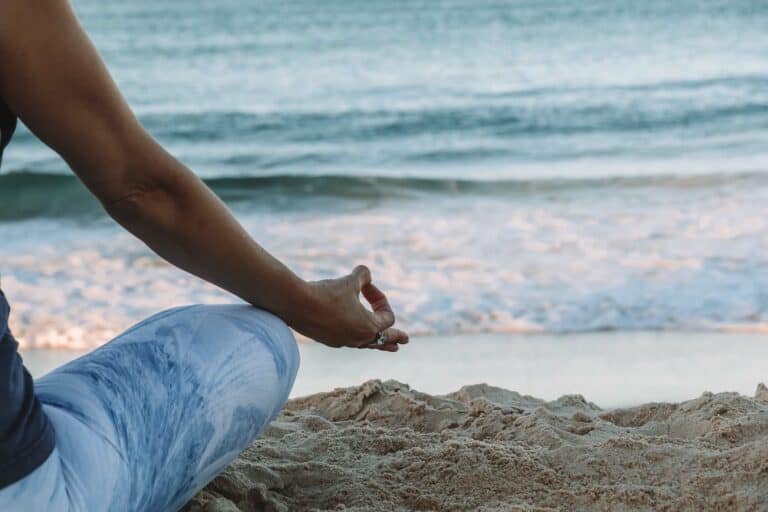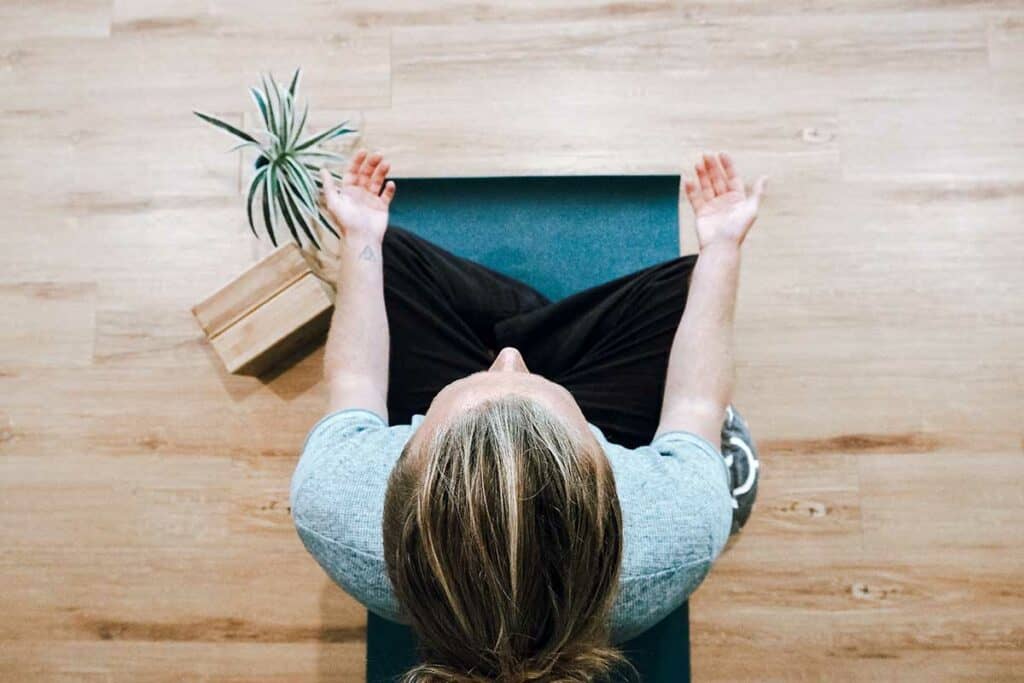These days it’s hard not to get overwhelmed once in a while. Between juggling family, work, and other activities, it is easy to be stressed about everything.
Stress is a fact of life, and no one can escape it. You can’t avoid it wherever you are and whatever you’re doing, but you can learn to manage it, so it doesn’t control you.
Many people use mindfulness meditation to deal with stress and anxiety. If you would like to know more what stress is, how it affects you, and how to use meditation, keep reading!
Defining Stress
Stress is the body’s reaction to a possibly dangerous situation. It’s the way human beings react both mentally and physically to changes. It affects your body by releasing chemical hormones such as cortisol and adrenaline.
This can help you respond to specific problems, but it also can negatively affect your health when you experience constant stress.
Changes in your life, such as having a different job, getting married, going to college, illness, or having a tricky test at school, can trigger stress. It can work differently for many people, so you must know yourself to identify your frequent sources of stress.
Knowing how to do this can take time, and it’s vital that you acknowledge that it’s impossible to avoid stress. You just have to learn how to minimize its harmful effects.
Why Do You Get Stressed Out
Your perception of an event or situation triggers stress. You will likely feel stressed if something bad happens, such as pressure at work or a family feud.
Speaking in public or catching a flight may excite many people, but perhaps for you, it’s a very stressful situation.
The most frequent reasons for it fall into three categories:
- Feeling like you have lost personal control.
- The feeling that an outside force is challenging or threatening you.
- Effects of possible changes in your life.
How Does Stress Affect Your Body?
When you perceive a situation as dangerous, your hypothalamus reacts by sending signals to your adrenal glands, releasing hormones that prepare you to face that danger.
Adrenaline is one of these hormones. It will:
- Accelerate your heartbeat and breathing rate.
- Contract your blood vessels.
- Stimulate increase of perspiration.
- Inhibit your insulin production.
This is helpful momentarily, but too much adrenaline can produce anxiety, insomnia, damage to your blood vessels, headaches, a higher risk of stroke and heart attack, hypertension, or high blood pressure.
Although adrenaline is essential, it isn’t the primary stress hormone. That’s cortisol.
Cortisol plays an essential role in our life. Among its many functions are:
- Raising the amount of glucose in your bloodstream and helping the brain to use it more effectively.
- Restraining functions that are nonessential in life-threatening situations.
- Altering immune system response.
These are all normal and crucial processes to human survival, but if your cortisol levels stay high for too long, its negative impact on your health can contribute to:
- Weigh gain
- Sleep disorders
- Lack of energy
- Brain fog and memory problems
- A weak immune system
Healthy Ways to Improve Your Day-to-day Activities with Mindfulness and Meditation
Mindfulness and meditation are not the same. However, understanding their fundamental differences can help you save time and develop a practice that helps you.
These two concepts are often used as the same thing, and for individuals who want to start meditating or living mindfully, this can and will be confusing.
Let’s start by defining each of them.
Meditation is a practice that involves clearing and focusing your mind using a combination of physical and mental techniques.
It was initially meant to help deepen understanding of life’s sacred and mystical things. Now you can use it for relaxing and stress relief.
Mindfulness is the basic human ability to be fully present, aware of what’s happening around you, and not judging or overreacting to it.
It is a quality that every human being possesses, so you just need to learn how to access it.
Differences
- Meditation Is a Practice, Mindfulness Is a Quality
While each concept has many definitions, the difference is apparent between these two.
Meditation is a practice where you can develop different qualities, and mindfulness is one of them.
Mindfulness is a specific way of living that can be achieved and cultivated through practice, so mindfulness meditation is just one of the many existing categories of meditative practice.
- Mindfulness Can Be Used Without Meditation
Since mindfulness is a quality associated with many mental health benefits, it can be easily achieved by taking action without meditation.
Here’s a small list of things you can do:
- Walk: The key is to be present at the moment. Feel the ground beneath your feet and how your body moves. Take a walk in the park to focus on this and avoid any distractions.
- Walk in nature: Instead of getting lost in your thoughts, walk in the mountain or the wood and ask yourself how it feels to be in that moment, in that place. Try noticing the little things you don’t usually see.
- Practice gratitude: This is another excellent way of practicing mindfulness. It can be done in the same room you are in right now. Even in this very second, stop your reading and list five seconds you’re thankful for. Acknowledge the present and take a deep breath.
- Eating with intention: Avoid the distraction of your phone or laptop. Eat slowly and concentrate more than ever on your food’s smell, taste, and texture. Be present and enjoy the moment.
- Listen and be present: When was the last time you took a step back and realized what you’re living at the moment? Maybe you’re spending time with your friends or having a family dinner. Stop scrolling on your phone, look around, be happy about the moment you’re living, and again: be present.
- Mindfulness Is Only One Aspect of Meditation
Concentration is key. Not all meditation aspect is focused on mindfulness.
When the mind is wandering, meditation can be challenging. Train your attention and try to stay focused.
Meditation has many ways to be done, but staying concentrated will allow you to have a more prosperous time and potentially more mindfulness every day.
Prevent Diseases Using Mindfulness and Meditation
Studies suggest that focusing on the present has a very positive impact on health and well-being.
Stress and anxiety are the most common causes of diseases. They all consist of excessive worries about the past or the future. If you focus on your present, those problems may disappear.
Mindfulness can be effective in reducing depression as well. There is also evidence that mindfulness can lower blood pressure and improve sleep.
We have all been there. Even if it’s not clinically diagnosed depression, everyone has reviewed in their mind – at least once – a conversation or discussion with someone, constantly repeating: “why did I say that?” or “I should have said this….”
Stay in the present, and you will remain healthy.
Others Stress-relief Techniques
Although mindfulness and meditation can help you improve your mental and physical health, you can try other stress-relief activities to maximize the benefits of meditation.
Let’s talk about them.
- Take Breaks from Screens
Suppose you wake up happy, confident about your day, and in a great mood. As the day goes forward, you start scrolling on your phone, and before you know it, your day is ruined because you spend more time than you should by doing nothing.
Being informed is good, but staying on your laptop or phone for long hours does not help you. Instead, use some apps to limit your screen time and help you rest from those devices. Sometimes anxiety comes from procrastinating.
2. Take Care of Yourself
Get plenty of quality sleep, exercise, eat healthily, stay hydrated, and always take a break if you feel overwhelmed. This will also help you prepare for a good meditation session and contribute to building that wanted mindfulness.
3. Do Other Activities
Sometimes routine can be deadly, so remember to try new activities for you to enjoy every day. There’s more in life than just going from work to home and back.
Go out on that weekend, go to see that movie that you wish to see, connect with your community or friends, or call your distanced relatives.
Work-related stress is one of the most common types. Set your mind to the present and take action.
4. Avoid Drugs and Alcohol
Drugs and alcohol do not provide any benefit to your health. They damage it.
Although they may seem to help, the additional problems that come with substance use can increase the stress you may be feeling right now.
5. Don’t Be Afraid to Ask for Help
Always acknowledge when you need more help. If you have tried everything and the problem continues, and you think you need help to solve it, try to reach a professional to guide you.
Final Thoughts
Mindfulness and meditation can be helpful in many situations, and it’s easier than it looks. You just need to be patient, though.
When trying something new, it is ok wanting to know what you’re doing. Stay focused on your objective, and don’t be stressed by releasing stress techniques.

















